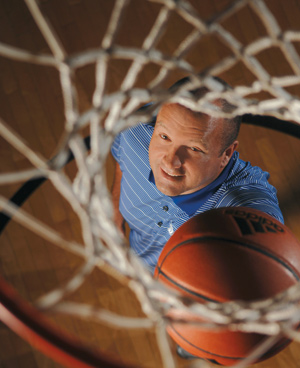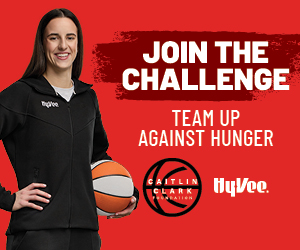 Written by Jim Duncan
Written by Jim Duncan
Photo by Duane Tinkey
[dropcap]D[/dropcap]rake University Athletic Director Sandy Hatfield Clubb came to Des Moines from Arizona State University. So when she moved quickly to hire Mark Phelps from that same school in 2008, people assumed the two were well-acquainted.
“Everybody thinks we were old friends,” she says of Phelps, Drake’s head basketball coach. “The truth is, I met Mark at my going-away party. I really didn’t know him at all. But I knew (Arizona State Head Coach) Herb Sendek, and he
encouraged me to talk to Mark when I was looking for a coach.”
Hatfield Clubb admits Phelps “was the sixth out of six people I talked to,” but after a 45-minute telephone interview, she gave the matter five minutes of thought.
“I called him back and put him on a plane to Des Moines the same day,” she recalls.
Phelps also acted quickly. Within seven days, he had accepted the Drake job, moved to Des Moines, and persuaded his future wife, Alissa, to marry him and follow him here.
“I grew up in Virginia Beach and lived in North Carolina and Phoenix,” says the 46-year-old Phelps. “Alissa is a chiropractor from New Jersey who moved to Arizona for the weather. Our first winter in Des Moines was brutal, so we wondered about what we had done. Now neither of us can imagine ever living anywhere else.”
‘Not a Typical Coach’
Phelps says his job interviewing skills were born from necessity.
“I am not a typical coach,” he says. “I didn’t play college basketball, and I wasn’t even a significant high school player.”
He was, however “close friends in high school with J.R. Reid,” he says. Before starring at North Carolina and in the National Basketball Association, Reid was rated the No. 1 high school player in America. Recruiters flocked to Virginia Beach, and some encouraged Phelps to influence his friend. One coach even promised to set him up in coaching if he helped deliver Reid to his college.
“That was the first time it had even occurred to me that coaching could be a livelihood,” Phelps recalls.
The idea of influencing young lives appealed to him. So did the competition of the profession. So after graduating from Old Dominion University in Norfolk, Va., Phelps coached at the high school level in Virginia. After taking teams to five straight state tournaments, he began pestering college coaches for a job.
“Herb Sendek finally hired me at North Carolina State—to get me to stop bothering his secretary on a daily basis,” Phelps jokes.
Such persistence is essential to succeed in coaching—and recruiting. Phelps’ calendar last July included flights every two or three days—to Virginia and New Jersey, then to Indianapolis and Milwaukee, then to Los Angeles, Las Vegas and Kansas City. He says he has more frequent-flier miles than he can count but never has had enough time to cash any in on a vacation.
Taking such recruiting trips is “a passion, but most people in this business joke that it’s a sickness,” he says.
The Futures Market
Phelps’ job in Des Moines came with unusual pressure. He followed Keno Davis’ sole year at Drake, one which produced the school’s first Missouri Valley Conference (MVC) championship since 1971. A new unrealistic bar had been set. But in his first four years, Phelps has won more games than any coach in Drake history, with a winning percentage second only to that of the legendary Maury John.
Phelps’ record has been even better on the recruiting trail, referred to in the business as “the futures market.” Two of his last three incoming classes were ranked No. 1 in the MVC. The third was ranked second. The last previous Drake class ranked that highly was in the early 1970s.
Phelps says recruiting is a sales job. “We have something special to sell,” he says. “Drake’s campus is beautiful, one of the nicest I‘ve seen anywhere. It looks good in all seasons. I’ve never seen a cleaner campus, either. I encourage recruits to use the men’s rooms because I know they will be immaculate.”
The campus is only half the package he touts. “There’s the city itself,” he adds. “I am so surprised how attractive Des Moines is to kids from both coasts, and from much larger
cities. There’s only one other city in our conference that compares to Des Moines. Personally, I think Des Moines has more going for it than Omaha, but I admit it‘s a close call.”
Phelps said recruits are given tours of downtown as well as suburban areas. “The metro sells itself,” he says.
Phelps also touts the MVC, the second oldest conference in the United States. “The Valley isn’t a household word, but it’s greatly respected by basketball junkies,” he says. “When you have a great campus (and) academics, a great city and a revered conference to sell, you can string together three straight good seasons of recruiting. That’s how you build a program.”
Phelps’ boss sees it that way, too. Drake President David Maxwell attends every game he can. “We are not looking for a flash-in-the-pan winning season,” he says. “Mark and his staff are working to build a winning program that has sustained success for years to come, and that’s a lot harder to do these days for a variety of reasons.
“Our goal is to compete for the Missouri Valley Conference championship and move on to postseason play on a regular basis, and to do it with young men who meet our standards for academic success as well,” Maxwell adds. “Those two criteria are not mutually exclusive.”
The New Season
Last year, Phelps was unusually unlucky with injuries. He lost both his starting center and his starting point guard before the first game. Then top scorer Ben Simons missed a key stretch. Still, that team’s nine MVC wins were the second most since 1986. Indeed, Drake futures are rated a “strong buy.”
“I’m really enthused about this year,” he says. “The group of players we have are the most passionate about the game, and about their team, of any group I‘ve had.”
There’s more than passion. All five returning players have been starters. Among eight new players, graduate student Chris Hines was Utah‘s second-leading scorer last year, despite playing all season with injuries. Two others are junior college graduates. That adds up to a lot of leadership. Five highly ranked freshmen add depth.
“Our skill level is better than in any year,” Phelps says. “This group shoots better and passes better.”
This optimist even sees a silver lining in star center Seth VanDeest’s yearlong rehabilitation from shoulder surgery. “Having missed an entire season, he’s going to be stronger than ever,” Phelps predicts. “He’ll play this year at 260 pounds. Before he was playing at 218.”
This year’s schedule is challenging. Drake plays three games in the Anaheim Classic with teams like California, Georgia Tech, Xavier and St. Mary’s. They play Iowa State University in the new Big Four doubleheader and both Detroit and Nevada on the road. (Detroit went to the NCAA tournament last year and Nevada won 28 games.)
Such games can pad a team’s RPI, the rating system that helps determine NCAA selections.
Phelps welcomes the challenge. Such a schedule, he says, “helps build the players’ morale, enthusiasm and focus.”
Jim Duncan, a Des Moines freelance writer, has observed Drake basketball through the careers of 14 of the school’s 27 coaches. Having experienced the ecstasy of championship, the desperation of infamous scandal, and the ennui of inglorious eras, he’s excited about the future.





